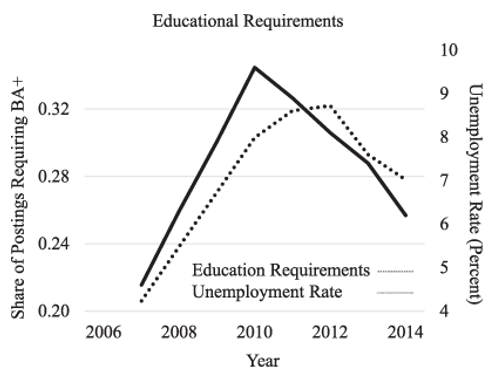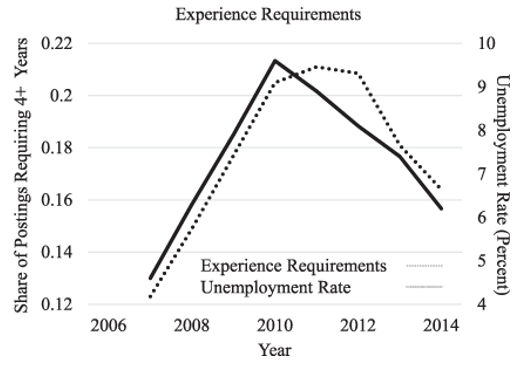I& #39;ve seen a few articles recently in which employers say they cannot find workers, and they assign blame to unemployment benefits being too generous.
This is one of the most important figures that provide context for hiring out of a recession
1/
This is one of the most important figures that provide context for hiring out of a recession
1/
It shows the share of job postings that required a bachelor degree (left axis) and the unemployment rate (right axis). The same relationship holds for experience. Here& #39;s the share requiring four years or more:
2/
2/
These figures are from a paper published last year that examined job postings and state unemployment rates. I highly recommend it.
The authors refer to this trend as "upskilling."
3/
https://direct.mit.edu/rest/article/102/4/793/96774/Upskilling-Do-Employers-Demand-Greater-Skill-When">https://direct.mit.edu/rest/arti...
The authors refer to this trend as "upskilling."
3/
https://direct.mit.edu/rest/article/102/4/793/96774/Upskilling-Do-Employers-Demand-Greater-Skill-When">https://direct.mit.edu/rest/arti...
It& #39;s also a pretty common speculation coming out recessions to wonder if the U.S. labor market has shifted in some unalterable way, that unemployed workers don& #39;t have the right skills for the the jobs in "Today& #39;s Economy," and that we need to retrain or educate more.
4/
4/
That shift would certainly explain employers wanting more education and experience (the education and experience lines trending up), but it wouldn& #39;t explain why that demand wasn& #39;t sustained (the lines falling again).
5/
5/
The authors show that the demand for more education and experience is driven by the size of the pool of unemployed workers.
It& #39;s not that workers don& #39;t want jobs, or that the economy has shifted, it& #39;s that employers are trying to get more when it& #39;s a buyers market.
6/
It& #39;s not that workers don& #39;t want jobs, or that the economy has shifted, it& #39;s that employers are trying to get more when it& #39;s a buyers market.
6/
I thought they had two really compelling methods to show that this is the case. First, they looked at requirements within-job title within *the same employer* !
7/
7/
In their words:
"For both education and experience requirements, we find a positive and significant relationship between employer skill requirements and labor market slack—even when controlling for the same job title at the same employer in the same state."
8/
"For both education and experience requirements, we find a positive and significant relationship between employer skill requirements and labor market slack—even when controlling for the same job title at the same employer in the same state."
8/
Second, they looked the supply of unemployed workers. This increases in recessions, but it also increases when large numbers of service members discharge. They call this the "veteran supply shock" and use it as a natural, identifying experiment.
9/
9/
Again, their words:
"The fact that this natural experiment provides results similar to our basic OLS regressions using the business cycle variation as well as the within firm × job-title fixed effects specifications strongly suggests...
"The fact that this natural experiment provides results similar to our basic OLS regressions using the business cycle variation as well as the within firm × job-title fixed effects specifications strongly suggests...
...a causal link between rising employer skill requirements and the increased supply of available workers."
10/
10/
Averages do not predict all individual experiences, but individual experiences do not negate the average.
Employers can have a hard time finding a worker, but the larger trend is that workers have a hard time finding a job.
/n
Employers can have a hard time finding a worker, but the larger trend is that workers have a hard time finding a job.
/n

 Read on Twitter
Read on Twitter



